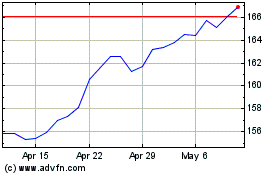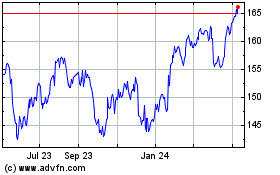Consumer Goods Take a 'Timeout' -- WSJ
February 17 2017 - 3:02AM
Dow Jones News
Slow times for sellers of consumer goods force company to
declare 'timeout'
By Brian Blackstone
VEVEY, Switzerland -- Nestlé SA has thrown out a long-running
sales-growth target -- at least for the next three years -- as the
world's largest packaged-food company and its rivals struggle with
ultralow inflation and fast-changing consumer tastes.
Major consumer-goods companies, once mostly insulated from
uncertain economic times, are scrambling to boost sales amid a host
of global economic difficulties. Sluggish sales in recent years at
Procter & Gamble Co. has forced it to cut costs and slim down.
Earlier this week, Trian Fund Management LP, a big activist fund,
said it had taken a stake in P&G, heightening urgency to turn
things around.
Unilever PLC last month reported weak sales trends for 2016, and
on Wednesday, Kraft Heinz Co. said it plans more savings than
initially targeted in the face of slow revenue growth.
Each company faces distinct challenges in an array of markets
and product categories. But all share broadly similar difficulties
that are largely out of their control: tough competition in many of
their biggest markets; currency swings that have affected costs;
difficulty raising prices amid low global inflation; and fickle
desires from consumers.
From companies like Nestlé, focused more on packaged food,
consumers have clamored for healthier offerings. But those products
have proven harder than expected to develop into big sales
drivers.
Acknowledging the industry's travails, Nestlé Chief Executive
Mark Schneider said the Swiss-based company would take a "timeout"
trying to boost organic sales by 5% to 6% each year -- a goal it
failed to reach again in 2016. Nestlé said on Thursday it achieved
organic sales growth -- a measure that strips out currency
fluctuations, acquisitions and divestments -- of just 3.2% last
year, down from 4.2% in 2015.
It was the fourth straight year that the maker of Nesquik
flavored drinks, Puppy Chow pet food and Stouffer's frozen meals
missed the target, and 2016's growth was the weakest since the
company started tracking the metric two decades ago.
Nestlé had emerged in recent years as a paradigm for the
consumer-products industry, largely because of how it overcame the
global financial crisis. But more recently its stock has lagged
behind its peers, falling more than 2% in the last year compared
with a 7.4% rise in the Stoxx 600 European consumer goods
index.
Nestlé shares fell 1% in European trading on Thursday.
Mr. Schneider, who started as CEO on Jan. 1, said the company's
new, more flexible sales target was "mid-single-digit organic
growth," as opposed to the long-specified 5%-6% target. But even
that vaguer goal won't kick in until 2020.
"This is a timeout from that model," Mr. Schneider said in an
interview. For the coming three years, "we don't wish to be
measured against that," he said.
Mr. Schneider said the company needed time to "cope with some of
the remaining deflationary trends we're seeing, and we also need
the time to adapt to some of these very fundamental changes that
we've witnessed in the consumer-goods industry."
He said deal making wasn't the answer. Nestlé isn't on the hunt
for any major acquisitions in the near term, he said, citing the
"fairly lofty valuations" in the consumer-goods sector. Rather,
Nestlé plans to push cost savings to maintain profitability, which
will "increase restructuring costs considerably," the company
said.
Nestlé has moved on several fronts to align its stable of
products with changing tastes. It has cut sugar and changed its
marketing strategy for Nesquik, and implemented new recipes at its
frozen-foods business, which includes Lean Cuisine.
The company has invested heavily in nutrition and health
sciences. But that division, which contributed 17% of overall sales
last year, is still small compared with mainstay businesses such as
beverages and prepared food.
Mr. Schneider's appointment as CEO underscores the urgency of
Nestlé's efforts to pivot. Coming from German health-care company
Fresenius SE, he marks the first outsider to take the helm at
Nestle in nearly a century and brings the deep background in the
sort of health-care businesses Nestlé has said is its future.
"Generally, the share of these products over time is going to
increase," Mr. Schneider said.
Things are unlikely to improve much in 2017, however. Nestlé
said it expects organic sales growth of between 2% and 4% this
year.
Nestlé said Thursday that 2016 sales were 89.47 billion Swiss
francs ($89 billion), up slightly from 2015 but just below
analysts' expectations. Net profit was 8.5 billion francs, down
from 9.1 billion francs in 2015 and well below analysts'
expectations of around 9.5 billion francs. Last year's profit was
weakened by a roughly half-billion franc noncash adjustment related
to local taxes.
Write to Brian Blackstone at brian.blackstone@wsj.com
(END) Dow Jones Newswires
February 17, 2017 02:47 ET (07:47 GMT)
Copyright (c) 2017 Dow Jones & Company, Inc.
Procter and Gamble (NYSE:PG)
Historical Stock Chart
From Mar 2024 to Apr 2024

Procter and Gamble (NYSE:PG)
Historical Stock Chart
From Apr 2023 to Apr 2024
